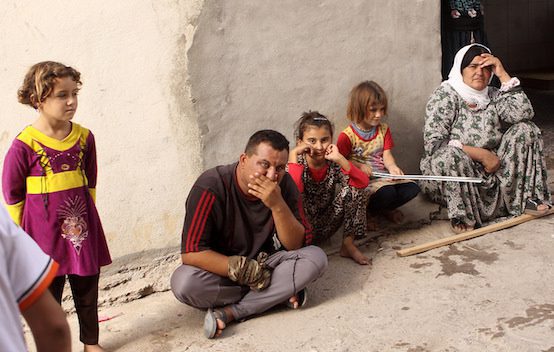We Have Unfinished Business in Iraq

Sometimes decisions in government really are about life and death. The other night in my Washington office, I stood in front of framed photos of young servicemen and women from Nebraska who had died in Iraq—some of their families I know, some I have never met. We’ve both given and lost so much already in that part of the world that it’s hard to understand why further engagement in Iraq is necessary. But there’s still work to be done, especially for ethno-religious minorities.
Here’s the hard reality: 400,000 Yazidis from Northern Iraq are still trapped in tent structures, unable to safely return home. Iraq used to be home to over 1.5 million Christians—today, only 250,000 hold on. Post-ISIS, Iranian-backed militias are now threatening the return of those Christians across large areas of Northern Iraq.
This is something the people of my district understand all too well. In April, I appeared on Nebraska Educational Television with Nibras Khudaida, one of Nebraska’s 3,000 Yazidis, the largest such community in America. I first met Nibras over two years ago in Lincoln after she wrote me a passionate letter in broken English. After serving as an intern in my office, Nibras went on to become a high school debate champion and give her class commencement address. She is now an honors student at Omaha’s Creighton University.
Nibras is among the beneficiaries of a program I helped introduce in Congress, which enabled her father and others who courageously served alongside American forces in Iraq to gain entry into the United States. It was for families like the Khudaidas—facing imminent death at the hands of a genocidal force—that our refugee and asylum programs were established. But as an international community, we should seek to create secure conditions on the ground so that displaced persons can repatriate to their homelands. For Nebraska’s Yazidis—now patriotic Americans who remain closely tethered to their ancient faith and cultural traditions—that is also what they want for their friends and family back home in Iraq.
The story of closure in Iraq involves three key dynamics. First, ISIS is largely defeated, but not extinct. With U.S. government leadership and a coalition of international partners in support, the Iraqi army, having fought valiantly, has become a serviceable force. Second, we have transferred funds from multilateral institutions into targeted relief for the most besieged peoples. Third, the sustained solvency of those funds depends upon more secure conditions in the region. That was my clear finding based on the evaluation I undertook on behalf of Vice President Mike Pence last summer in Iraq.
My guest at this year’s State of the Union, Nobel Peace Prize winner Nadia Murad, agrees. She was sold into sexual slavery by ISIS before escaping with the help of a Muslim family. Before Nadia arrived at my office, I told a Washington Post reporter that the most important need for Northern Iraq was a security settlement to protect ethno-religious minorities. Upon her arrival, and with no advance coordination from me, Nadia affirmed that same conclusion.
In pursuit of that goal, my friend Congresswoman Anna Eshoo, Democrat of California, and I recently introduced the bipartisan H. Res. 259, informally known as The Security Resolution for Northern Iraq, which:
- Makes it a policy priority of the United States to support the safe return of the displaced indigenous people of the Nineveh Plain and Sinjar to their ancestral homeland;
- Calls upon the Iraqi government and Kurdistan Regional Government to better integrate religious minorities into the Iraqi Security Forces and Kurdish Peshmerga;
- Stresses the importance of working with international partners to accomplish these goals.
The Security Resolution for Northern Iraq represents a modest commitment with enormous implications. I am hopeful that Congress will agree. If this Iraqi-led security settlement does not come to fruition, Iranian-backed militias will continue to meddle in Northern Iraq, religious and ethnic minorities will continue their mass exodus to Europe, and permanent refugee camps will dot the landscape.
Nothing will ever compensate for the tremendous loss of life and limb that Americans endured to ensure that Iraq could have a glimpse of normalcy, a glimmer of possibility, a chance for permanent peace. Carrying out this last duty is not going to fill the holes in their families’ hearts. It will, however, help provide closure to America’s decades-long involvement in Iraq, all while ensuring stability and justice for the oppressed, and the preservation of Iraq’s rich tapestry of religious pluralism so essential for peace in the Middle East.
Congressman Jeff Fortenberry is a Republican representing the 1st District in Nebraska.
Comments